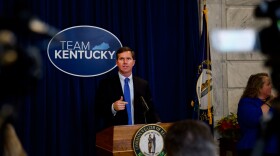The scene at Jefferson Mall on Saturday morning was painfully familiar. A shooting had drawn dozens of police officers, several ambulances, civilian onlookers, and a helicopter circling overhead.
A victim was taken to the hospital in unknown condition. The police weren’t releasing information about the shooter or motive.
Justin Vincent was in the parking lot about to enter the mall when he heard gunshots inside.
“Everybody started panicking, obviously,” said Vincent, who came to the mall to buy clothes for his child. “There was two different shootings last night. Four people died. It’s just crazy … What is the world coming to?”
2020 is breaking records for violence in Louisville. Between January and Sept. 13, there were 115 criminal homicides in the city. That's nearly double the 63 homicides over that period in 2019, and more than twice the 56 homicides in 2018, according to LMPD data.
The city's 525 shooting cases in 2020 are more than double the number of shootings over those nine months in each of 2019, 2018, and 2017.
The violence is ongoing. On Friday night and Saturday morning, two separate shooting incidents left four dead.
One of the victims was Marvin McAtee, nephew of David McAtee, the West End barbecue chef who was shot and killed by a Kentucky National Guard member in June.
The shooting was reported not far from YaYa’s BBQ, where David McAtee worked and died.
“The way you’re asking me how I feel about the police after they did something to my uncle, I’m still saying I love them,” Marvin McAtee told WFPL in June, at a memorial for his uncle. “I love them people. These my neighbors. These my neighbors. We here together. There’s no way in the world I’m not supposed to love my neighbors.”
This weekend's other shooting occurred at Bungalow Joe's restaurant in southeast Louisville, according to restaurant owner Joe Bishop. Bishop didn’t return a request for comment, but in a Facebook post, he said someone walked up to his restaurant’s patio and shot three people point-blank, "for no reason.”
“There was no motivation, no altercation, no fight," Bishop wrote. "I had many of my employees and customers sitting there that are now forever traumatized.”
Violence tends to have many causes, and it’s often impossible to pinpoint the exact social, economic, or personal reasons an individual commits a homicide or a community experiences a crime wave.
Still, the widespread discord and dissatisfaction sown by the pandemic have ripple effects, which might be contributing to the spike in homicides. Unemployment has skyrocketed, and many families are facing privation.
“People definitely didn’t take this semi-isolation very well,” said Damir Huremović, a New York psychiatrist and author of “Psychiatry of Pandemics: A Mental Health Response to Infection Outbreak.”
"This climate in itself is kind of favorable to disruption, and then political conflict, and even physical conflict,” said Huremović. “People are generally concerned with what is going to happen, if not from the disease, then from the situation: Are they going to have jobs? How are they going to provide for themselves and their families?”
The data backs him up: during late June, four in ten U.S. adults reported struggling with mental health issues or substance use, according to the CDC. Substance use is also rising locally. There were 251 drug overdoses so far in 2020, 49% more than at this point in 2019, according to LMPD statistics.
Huermović described the current pandemic as a “disruption in the social fabric,” with consequences for mental health and individual welfare. The widespread fear of illness and death leads some people to act on social grievances they otherwise wouldn’t have addressed, he said.
“Here we are, and we could all die. Now maybe this is the time to make my voice heard and say what’s on my mind,” he said.
For Louisville residents, the spate of homicides is worrisome and tragic. Earlene and George, who didn’t want to give their last names, got to Jefferson Mall about an hour after the shooting. They sat in their car, and mourned.
“It didn’t used to be as bad. This is ridiculously bad. You go to sleep, you wake up, there’s no good news. I haven’t heard any good news in a while,” said Earlene. “It’s sad. It’s so sad. Just hang onto your faith and keep praying.”






